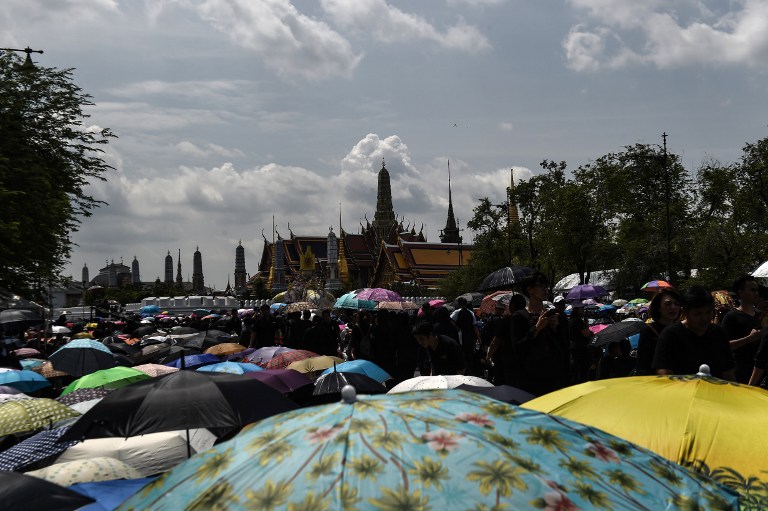BANGKOK, Thailand | AFP | — Tens of thousands of black-clad Thais converged on Bangkok’s Grand Palace on Saturday to sing the royal anthem in a striking display of devotion to the recently deceased King Bhumibol Adulyadej.
The monarch, who died on October 13 following years of poor health, was seen as a moral icon and rare figure of unity in a kingdom dogged by corruption and political turmoil.
His death has plunged the nation into grief, with the government declaring a one-year mourning period and urging the public to don black and dial down all festivities for at least 30 days.

Thailand’s King Bhumibol Adulyadej died at the age of 88 on October 13 after years of ill health, ending a seven-decade reign and leaving the politically divided nation without its key pillar of unity. / AFP PHOTO / LILLIAN SUWANRUMPHA
Crowds have been massing outside his glittering Bangkok palace for the past week, with many journeying from far away provinces to pay respects to a man celebrated as the father of the nation.
Some have pitched tents on a large grassy field outside the royal compound, while others have slept on simple bamboo mats.
On Saturday, a sea of black filled the parade field and surrounding streets as tens of thousands of Thais stood to sing the royal anthem alongside a professional orchestra and choir.
Many held up portraits or bank notes bearing Bhumibol’s face as they sang, some through tears.
“The atmosphere is amazing,” said Sethabutra Biraseranee, who like most was dressed in all black despite Bangkok’s sweltering midday sun.
“As you can see, all these people here came just to pay their respects to him, which shows how great he was.”
– Uncertain future –
Public displays of mass devotion have been encouraged by Thailand’s arch-royalist military rulers, who grabbed power in a 2014 coup many believe was staged to ensure a smooth succession.
Bhumibol served as an anchor of stability during his 70-year reign and his passing thrusts the kingdom into an uncertain future.
Little is known about what the heir, Crown Prince Maha Vajiralongkorn, will do with a crown that is granted few legal powers but became a position of vast influence under Bhumibol’s charismatic reign.
In a move that surprised many, the 64-year-old asked to delay his proclamation as king in order to grieve with the nation, according to junta chief Prayut Chan-O-Cha, who has presided over the transition.
The regime has not provided a clear timeline for when the prince will formally ascend the throne.
Bhumibol charmed Thais with his reputation as a hard-working monarch who eschewed a lavish lifestyle and dedicated himself to rural development projects, tromping up mountains and through jungles to meet his subjects and listen to their concerns.
The crown prince, who has been attending to Buddhist funeral rights along with his siblings, is known for a flashier lifestyle and has spent much of his life overseas.
While the outpouring of grief over Bhumibol’s death has been overwhelmingly sober and dignified, it has also unleashed small pockets of ultra-monarchist forces that have shamed, mobbed and in some cases beaten Thais seen as criticising the monarchy.
The government has condemned this vigilantism but stepped up its own surveillance of royal defamation — a crime that carries 15 years in jail per offence under the kingdom’s lese majeste law.
The legislation has seen scores of Thais thrown behind bars — sometimes for decades — for perceived slights against the monarchy.
All media based inside the country must heavily self-censor to avoid violating the law, which has been wielded with renewed vigour by the junta.
tp/ssm/mtp
© 1994-2016 Agence France-Presse







